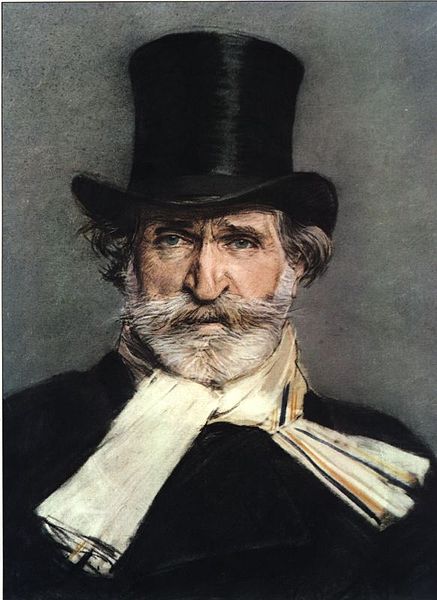*Image Credit: Wikimedia Commons Life in the 19th century, fueled by the rapid advancements of the Industrial Age, gave birth to a vast number of world-class artists in every medium. Among the most famous in music is composer Giuseppe Verdi, born on October 10, 1813 in the French town of Le Roncole. Recognized for his skill by his mid-20s, Verdi managed to create some of the most beloved operatic pieces in history. Though technically a citizen of France by birth, Verdi grew up in a decidedly Italian family. Educated in the Jesuit tradition in the town of Busseto, he moved to Milan as a young man in order to expose himself to a wider range of musical instruction. Attending operas and concerts, he meshed the lessons from his private instructor into a vision all his own. Popular amongst the well-to-do, Verdi began to compose original works, returning to his hometown to work as a music teacher supported by wealthy businessman Antonio Barezzi. Hired to help Barezzi’s daughter Margherita learn to read and play music of the day, Verdi soon fell in love with his student. Married at the age of 22, the pair were nearly inseparable. Within two years, Margherita had given birth to two children, both of which died after just a few months. Stricken by horrifying luck, Verdi would soon lose his wife to illness, as well. Sadly, all of this personal tragedy happened just as he began to see his work reach a wider audience. Late in 1839, just weeks after the death of his second child, Verdi’s Oberto took the stage at La Scala, Milan’s world-renowned opera house. Overcome with grief after burying Margherita, his second composition would fall flat the following year. But for the encouragement of Bartolomeo Merelli, the man responsible for La Scala’s performance calendar, Verdi might have given up entirely. For the 1842 season, he offered up Nabucco. It was an instant sensation. The artist now entered the most prolific period of his life, producing 14 operas in the less than a decade, including Macbeth, his first to break with Italian tradition and offer up something other than a tale of the joys and pain of romance. Four years later, in 1851, his debuted his masterpiece, Rigoletto. Now one of the most sought-after talents of his era, Verdi continued to push the limits of his composition, frequently taking plays from famous authors — Victor Hugo and Alexandre Dumas — and giving them the extravagant preparation befitting a soaring opera. By 1853, at the end of his “galley years,” as he called them, he had created two more favorites: Il Trovatore and La Traviata. Wildly successful, Verdi showed no signs of slowing down. Receiving commissions from all over the world, he wrote music for everything from funerals to ballets to grand operas. The last of his most famous works, Aida, was written in 1869. He continued working well into life, writing his final composition just a few years before his death on January 27, 1901 in Milan. As a tribute to his genius, his funeral featured orchestras from all over the country playing for a crowd of 200,000. Also On This Day: 680 – Caliph Yazid I captures and decapitates Hussain bin Ali, grandson of the prophet Muhammad, at the Battle of Karbala, creating the Shi’a Muslim mourning holiday of Aashurah 1845 – The United States Naval Academy Opens 1868 – Carlos Cespedes declares independence for Cuba with the Grito de Yara 1913 – Construction on the Panama Canal is completed 1928 – Chiang Kai-Shek becomes Chairman of the People’s Republic of China
October 10 1813 CE – Italian Composer Giuseppe Verdi is Born
*Image Credit: Wikimedia Commons Life in the 19th century, fueled by the rapid advancements of the Industrial Age, gave birth to a vast number of world-class artists in every medium.…
438
